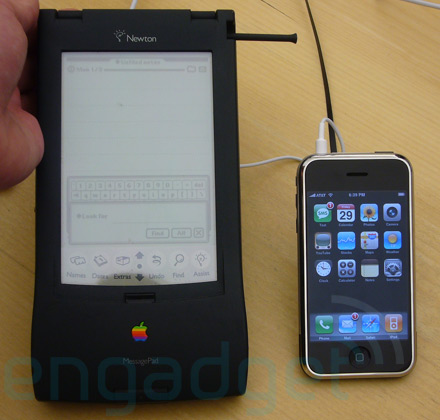First tablet
 Translation of an article by famous blogger John Gruber, in which he nostalgic about Apple Newton. The second part is here .
Translation of an article by famous blogger John Gruber, in which he nostalgic about Apple Newton. The second part is here .I really enjoyed the Paul Thurrott report on the events of last week’s CES. It’s hard to talk about such a big exhibition in prose, and Tarrot succeeded.
I was also amused by the title of his article: “An Exclusive Report! Microsoft announces Tablet PC to Apple! ”It further says:“ The technology industry excitedly discusses Apple’s coveted tablet computing device, but Microsoft is ahead of it: I tell you a secret that Microsoft will present its tablet PC to the market before Apple And I have an exclusive photo of the prototype of this incredible innovative product, the trendsetter of the industry ... from 2001. This device went on sale in 2002. Almost eight years ago.
')
The author’s irony is that Microsoft supposedly was the forerunner of any Apple variations on tablets as far back as 2001, and today no one remembers that. This is ridiculous for two reasons. First, with all the subjectivity of the hype around the Apple tablet, I have not yet met a single person, who would really think that the tablets do not exist yet. The hype is not that Apple may show the first tablet device, but that it may be incredible. I imagine such a terroot-film critic who is outraged by the hype around Kubrick’s film “Space Odyssey of 2001”, because nine years earlier Ed Wood had already shot Plan No. 9 from deep space.
Secondly, if you start to figure out who was the first, then isn't it Apple itself? After all, it was she who in 1993 brought the Newton MessagePad to the market. It was a delightful device that, even today, would look good against the background of the iPhone and any potential Apple novelty. I think most readers have never seen Newton, and this is very unfortunate. It was a wonderful, innovative device.
The modern “desktop” computer interface has not fundamentally changed since 1984: we use a keyboard, mouse or navigation pad to enter data, overlapping screen windows and the hierarchical file system in which we create “document files”. Has it ever occurred to you that this will not always be the case? What one day the computer industry will leave from modern interfaces, which are not always simple even for specialists, not to mention beginners (think how difficult it is to teach a person to double-click). But at the same time, no one seriously believes that in 50 years from now computers will use the same metaphors and input methods. But what then will they be?
Newton and was the first answer to this question. In Newton there were new metaphors and abstractions, in many ways ahead of Mac. Today we take for granted that in many applications (including network applications), you do not need to explicitly save changes or, say, choose a unique name and set a folder for any newly created object. In Newton it was already in 1993 across the system. Even from the name Newton exuded something great. It was inferior to Mac in performance and software capabilities (all Newton were black and white), but at the peak of newtones (there was one), which only intensified during the period of Mac failures, it seemed to everyone that in the future Newton interface paradigms would form the basis of Apple’s flagship computers - and over time, and all the rest. Paradigm of Newton, which he could well become.
I could never understand why Newton collapsed. It seems to me that there is no simple explanation. His problems and shortcomings were multidimensional, it was a complex set of different factors. As a result, when Steve Jobs returned to the captain's Apple bridge, he sent the entire Newton grocery line to scrap. A lot of people, including me, believe that it was quite possible to save Newton. Yes, he did not catch the stars from the sky, but there was no commercial failure either. The success of Palm in the 1990s proved that the market for Newton existed.
However, I also understand that with Steve Jobs, Newton simply had no chance. It was created just during the absence of Jobs at Apple. I would even venture to assert that Newton is the quintessence of non-Jobs Apple, with all its pluses and minuses. In some ways, it was a fundamentally different company than the new Apple Jobs. I do not think that Jobs is the modern King Midas, capable of turning everything he touches into gold. His talent is in the ability to carry out the entire process of product development from and to, and not in bringing products created by others, and especially not patching up holes in them. Some loyal fans of Newton saw in the act of Jobs personal motives: he had a grudge against John Sculley, whose brainchild was Newton. However, it seems to me that everything is somewhat simpler: Jobs simply did not like Newton as such. And for an Apple product to go, Jobs needs to like it.
Source: https://habr.com/ru/post/80882/
All Articles